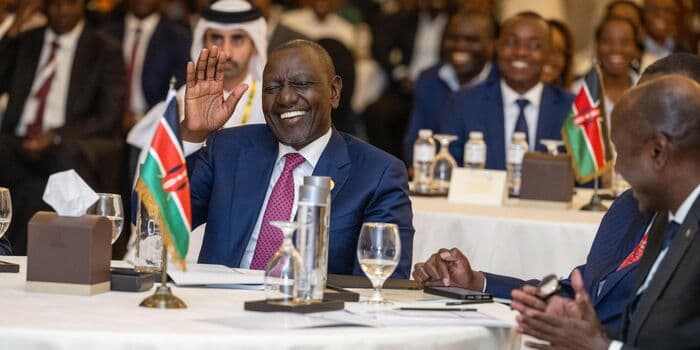We're loading the full news article for you. This includes the article content, images, author information, and related articles.
President William Ruto has instructed the Central Bank of Kenya to develop a new framework to significantly lower the cost of sending money home for the diaspora, a move aimed at boosting Kenya's largest source of foreign exchange.

President William Ruto has announced a new government initiative aimed at reducing the high cost of diaspora remittances, a critical lifeline for the Kenyan economy. Speaking to the Kenyan community in Doha, Qatar, on Tuesday, November 4, 2025, the President revealed he has directed the Central Bank of Kenya (CBK) to collaborate with the International Association of Money Transfer Networks (IAMTN) to create a more affordable and efficient system for Kenyans working abroad to send money home.
This directive targets the transaction fees that currently stand between 5 and 7 per cent for many Kenyans, particularly those in the Middle East. "It is our intention to support you. We know that it costs between 5 to 7 per cent of the money you send. We want to make it cheaper and faster," President Ruto stated during the engagement. The plan envisions a new regulatory framework that would allow licensed money transfer companies and fintech platforms to integrate directly with Kenyan banks and mobile money systems, thereby cutting out expensive intermediaries.
Diaspora remittances have been Kenya's largest source of foreign exchange since 2015, surpassing traditional sectors like tourism, tea, and horticulture. In the first nine months of 2025, total inflows reached approximately $3.77 billion (KSh 487.23 billion), a 3.70 per cent increase from the same period in 2024. Projections for the full year suggest that total remittances could surpass the $5 billion mark for the first time. These funds are crucial for Kenya's macroeconomic stability, supporting the Shilling, bolstering foreign exchange reserves, and directly improving the livelihoods of millions of households by financing education, healthcare, and local investments.
The United States remains the largest source of these funds, accounting for over 54 per cent of total remittances in the first nine months of 2025. However, recent data from the CBK shows a significant drop in remittances from Saudi Arabia, previously a fast-growing corridor. This decline is attributed to a new skills-based work permit system implemented by the Gulf nation, which has disrupted wages and contracts for many Kenyan workers.
Despite the vital role of remittances, the cost of sending money to Sub-Saharan Africa remains the highest in the world. According to the World Bank, the average cost to send $200 to the region was 8.37% in the second quarter of 2024, significantly higher than the global average and the United Nations' Sustainable Development Goal target of 3%. These high costs are often due to a reliance on traditional cash-based systems and the involvement of multiple intermediaries, each taking a percentage of the transaction.
Financial technology (fintech) companies have been working to disrupt this model by offering digital-first solutions that bypass traditional banking networks, leveraging mobile money and direct bank deposits to offer faster and cheaper transfers. President Ruto's new initiative appears to align with this trend, aiming to create a more integrated payment system that leverages Kenya's robust mobile money infrastructure.
The move to lower remittance costs is part of a broader government strategy to engage the estimated four million Kenyans living abroad. President Ruto also confirmed that the government is in the final stages of creating a Diaspora Bond, which will provide a platform for Kenyans abroad to invest directly in national development projects while earning a return. "We are in the final stages of a diaspora bond to help Kenyans in the diaspora support investments back home while earning income," he said, noting the proposal awaits final Cabinet approval. This follows earlier announcements by Prime Cabinet Secretary Musalia Mudavadi, who in September 2024, unveiled a strategic plan to lower remittance costs and boost annual inflows to KSh 1 trillion by 2027.
The Central Bank of Kenya has been actively regulating the money transfer sector to ensure financial stability and consumer protection. The CBK licenses and supervises Money Remittance Providers under the Money Remittance Regulations, 2013, and has issued warnings against using unlicensed and unregulated services like "hawala." The new directive from the President will require the CBK to build on this existing framework to foster an even more competitive and cost-effective market for international money transfers, ultimately benefiting millions of Kenyans at home and abroad.
Keep the conversation in one place—threads here stay linked to the story and in the forums.
Sign in to start a discussion
Start a conversation about this story and keep it linked here.
Other hot threads
E-sports and Gaming Community in Kenya
Active 9 months ago
The Role of Technology in Modern Agriculture (AgriTech)
Active 9 months ago
Popular Recreational Activities Across Counties
Active 9 months ago
Investing in Youth Sports Development Programs
Active 9 months ago